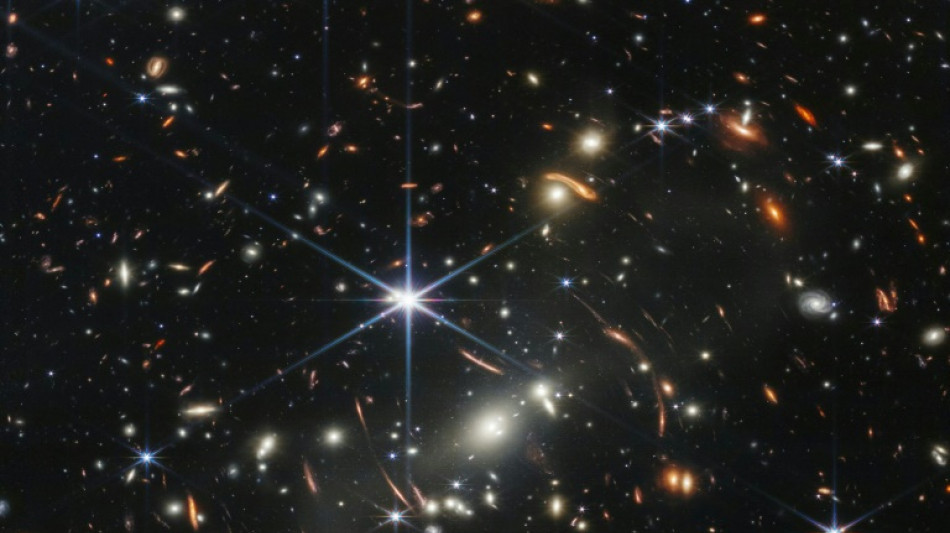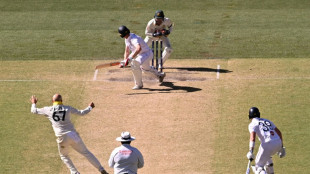
-
 Swiss Von Allmen pips Odermatt to Val Gardena downhill
Swiss Von Allmen pips Odermatt to Val Gardena downhill
-
Vonn claims third podium of the season at Val d'Isere

-
 India drops Shubman Gill from T20 World Cup squad
India drops Shubman Gill from T20 World Cup squad
-
Tens of thousands attend funeral of killed Bangladesh student leader

-
 England 'flat' as Crawley admits Australia a better side
England 'flat' as Crawley admits Australia a better side
-
Australia four wickets from Ashes glory as England cling on

-
 Beetles block mining of Europe's biggest rare earths deposit
Beetles block mining of Europe's biggest rare earths deposit
-
French culture boss accused of mass drinks spiking to humiliate women

-
 Burning effigy, bamboo crafts at once-a-decade Hong Kong festival
Burning effigy, bamboo crafts at once-a-decade Hong Kong festival
-
Joshua knocks out Paul to win Netflix boxing bout

-
 Dogged Hodge ton sees West Indies save follow-on against New Zealand
Dogged Hodge ton sees West Indies save follow-on against New Zealand
-
England dig in as they chase a record 435 to keep Ashes alive

-
 Wembanyama 26-point bench cameo takes Spurs to Hawks win
Wembanyama 26-point bench cameo takes Spurs to Hawks win
-
Hodge edges towards century as West Indies 310-4, trail by 265

-
 US Afghans in limbo after Washington soldier attack
US Afghans in limbo after Washington soldier attack
-
England lose Duckett in chase of record 435 to keep Ashes alive

-
 Australia all out for 349, set England 435 to win 3rd Ashes Test
Australia all out for 349, set England 435 to win 3rd Ashes Test
-
US strikes over 70 IS targets in Syria after attack on troops

-
 Australian lifeguards fall silent for Bondi Beach victims
Australian lifeguards fall silent for Bondi Beach victims
-
Trump's name added to Kennedy Center facade, a day after change

-
 West Indies 206-2, trail by 369, after Duffy's double strike
West Indies 206-2, trail by 369, after Duffy's double strike
-
US strikes Islamic State group in Syria after deadly attack on troops

-
 Awake Breast Augmentation: Gruber Plastic Surgery Highlights Live Implant Sizing Under Local Anesthesia With No Sedation for Eligible Patients
Awake Breast Augmentation: Gruber Plastic Surgery Highlights Live Implant Sizing Under Local Anesthesia With No Sedation for Eligible Patients
-
Epstein files opened: famous faces, many blacked-out pages

-
 Ravens face 'special' Patriots clash as playoffs come into focus
Ravens face 'special' Patriots clash as playoffs come into focus
-
Newly released Epstein files: what we know

-
 Musk wins US court appeal of $56 bn Tesla pay package
Musk wins US court appeal of $56 bn Tesla pay package
-
US judge voids murder conviction in Jam Master Jay killing

-
 Trump doesn't rule out war with Venezuela
Trump doesn't rule out war with Venezuela
-
Haller, Aouar out of AFCON, Zambia coach drama

-
 Nasdaq rallies again while yen falls despite BOJ rate hike
Nasdaq rallies again while yen falls despite BOJ rate hike
-
Bologna win shoot-out with Inter to reach Italian Super Cup final

-
 Brandt and Beier send Dortmund second in Bundesliga
Brandt and Beier send Dortmund second in Bundesliga
-
Trump administration begins release of Epstein files

-
 UN Security Council votes to extend DR Congo mission by one year
UN Security Council votes to extend DR Congo mission by one year
-
Family of Angels pitcher, club settle case over 2019 death

-
 US university killer's mystery motive sought after suicide
US university killer's mystery motive sought after suicide
-
Rubio says won't force deal on Ukraine as Europeans join Miami talks

-
 Burkinabe teen behind viral French 'coup' video has no regrets
Burkinabe teen behind viral French 'coup' video has no regrets
-
Brazil court rejects new Bolsonaro appeal against coup conviction

-
 Three-time Grand Slam winner Wawrinka to retire in 2026
Three-time Grand Slam winner Wawrinka to retire in 2026
-
Man Utd can fight for Premier League title in next few years: Amorim

-
 Pandya blitz powers India to T20 series win over South Africa
Pandya blitz powers India to T20 series win over South Africa
-
Misinformation complicated Brown University shooting probe: police

-
 IMF approves $206 mn aid to Sri Lanka after Cyclone Ditwah
IMF approves $206 mn aid to Sri Lanka after Cyclone Ditwah
-
Stocks advance as markets cheer weak inflation

-
 Emery says rising expectations driving red-hot Villa
Emery says rising expectations driving red-hot Villa
-
Three killed in Taipei metro attacks, suspect dead

-
 Seven Colombian soldiers killed in guerrilla attack: army
Seven Colombian soldiers killed in guerrilla attack: army
-
Amorim takes aim at Man Utd youth stars over 'entitlement'


'Mind-blowing': Astronomers spot most distant radio burst yet
Eight billion years ago, something happened in a distant galaxy that sent an incredibly powerful blast of radio waves hurtling through the universe.
It finally arrived at Earth on June 10 last year and -- though it lasted less than a thousandth of a second -- a radio telescope in Australia managed to pick up the signal.
This flash from the cosmos was a fast radio burst (FRB), a little-understood phenomenon first discovered in 2007.
Astronomers revealed on Thursday that this particular FRB was more powerful and came from much farther away than any previously recorded, having travelled eight billion light years from when the universe was less than half its current age.
Exactly what causes FRBs has become one of astronomy's great mysteries. There was early speculation that they could be radio communication beamed from some kind of extraterrestrial, particularly because some of the signals repeat.
However scientists believe the prime suspects are distant dead stars called magnetars, which are the most magnetic objects in the universe.
Ryan Shannon, an astrophysicist at Australia's Swinburne University, told AFP it was "mind-blowing" that the ASKAP radio telescope in Western Australia had spotted the radio burst last year.
- 'Lucky' -
"We were lucky to be looking at that little spot in the sky for that one millisecond after the eight billion years the pulse had travelled to catch it," said Shannon, co-author of a study describing the find in the journal Science.
The FRB easily beat the previous record holder, which was from around five billion light years away, he added.
The pulse was so powerful that -- in under a millisecond -- it released as much energy as the Sun emits over 30 years.
Shannon said that there could be hundreds of thousands of FRBs flashing in the sky every day.
But around a thousand have been detected so far, and scientists have only been able to work out where just 50 came from -- which is crucial to understanding them.
To find out where the latest radio burst -- dubbed FRB 20220610A -- came from, the researchers turned to the Very Large Telescope in Chile.
It found that the signal originated from a particularly clumpy galaxy that may have been merging with one or two other galaxies, which could in turn have created the bizarre magnetar.
Shannon emphasised that this was just the team's "best hunch".
FRBs have been detected coming from unexpected places, including from within our own Milky Way galaxy, so "the jury's still out" on what causes them, he said.
Aside from trying to uncover the secrets of FRBs, scientists hope to use them as a tool to shed light on another of the universe's mysteries.
- Where's the matter? -
Just five percent of the universe is made up of normal matter -- what everything you can see is made out of -- while the rest is thought to be composed of the little understood dark matter and dark energy.
But when astronomers count up all the stars and galaxies in the universe, more than half of that five percent of normal matter is "missing", Shannon said.
Scientists believe this missing matter is spread out in thin filaments connecting galaxies called the cosmic web, however it is so diffuse current telescopes cannot see it.
That's where fast radio bursts come in.
They are "imprinted with the signature of all the gas they travel through", Shannon said.
Some FRB wavelengths are slightly slowed down when travelling through this matter, giving scientists a way to measure it.
This could allow them work out how much matter is in the cosmic web -- and therefore, the total weight of the universe.
For the record-breaking FRB, Shannon said the team had noticed signals of "extra materials" the burst had passed through on its journey through the universe.
But to use this information to get a proper measurement of the universe's weight, hundreds more FRBs will likely need to be observed, he added.
With much more advanced radio telescopes expected to go online soon, astronomers hope that will happen relatively quickly.
Liam Connor, an astrophysicist at the California Institute of Technology not involved in the research, told AFP that future radio telescopes will find tens of thousands of FRBs, allowing scientists to weigh all the matter "across cosmic epochs".
P.M.Smith--AMWN



